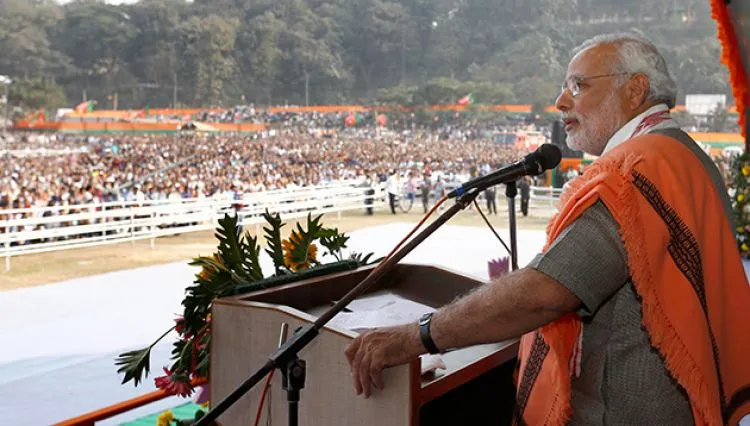India rebukes analyst claims it will miss clean energy targets
Oct 10, 2019 08:26 PM ET

Expert warnings that India will be falling short of its renewable deployment targets have sparked a strong-worded rebuke from the government, which has slammed them as “ill-founded”
The Ministry of New and Renewable Energy (MNRE) said this week it is confident India will “not only meet but [also] exceed” its goal to hit 175GW in installed clean energy capacity by 2022, contradicting claims to the contrary by consultancy CRISIL.
Over the weekend, CRISIL analysts had released a note warning India's “enduring policy uncertainty and tariff glitches” could see renewable capacity grow only to 104GW by 2022, 42% short of the government’s 175GW target.
On Thursday, the Ministry countered by describing the claims as lacking credibility “in all respects” given CRISIL’s decision not to consult the government. The consultancy’s prediction “is neither factually correct nor takes into account initiatives taken by the [Ministry],” MNRE argued.
The Ministry pointed at the 82.58GW in installed renewables across the country as of September 2019. The addition of an under-construction 31.15GW by Q1 2021 – plus a further bidding-stage 39GW, set to be rolled out by Q3 2021 – would leave India just 23GW short of its target, MNRE said.
Growth, the Ministry argued, will be helped along by three recently-launched schemes. Up to 12GW of grid-linked solar could be deployed under the so-called CPSU programme, coupled with incentives for 20GW-plus of rooftop solar and a third scheme to roll out solar in farms.
A 'material waning' of developer interest amid policy swings
The CRISIL report at the heart of the controversy linked India’s slower-than-expected renewable growth to policy swings. The “incoherence”, the consultancy had claimed, has already been found to drive investors away over the past few months.
CRISIL offered figures to illustrate what it described as a “material waning” of developer interest in Indian renewables. According to the firm, 26% of the 64GW auctioned over the past fiscal year was met with muted or nonexistent bidding, with tender cancellation on the rise.
A particular issue, CRISIL said, has been the increasingly low tariff caps set by central and state power distributors. Coupled with land and capital costs, as well as payment delays, the low tariffs have crippled the viability of solar and wind projects, the consultancy claimed.
The Ministry’s retort on Thursday was that it has “worked systematically” to resolve issues with renewable policy, and has been “lauded” by market operators for its efforts to set up “competitive, transparent bidding”. On the subject of lower tariffs, MNRE said: “[The government’s] endeavour remain that renewable power is procured at a rate which is acceptable to distribution companies.”
MNRE had also words for one of India’s renewable controversies of recent months, that of the tariff renegotiation in the Andhra Pradesh state. The move, CRISIL had claimed, has resulted in clean energy players being owned 2,600 crore (around US$365 million) by the state’s discoms.
Admitting that the renewable journey has not been without “continuous challenges”, the Ministry said: “When [Andhra Pradesh] announced intention to revisit already signed PPAs, the Ministry very quickly clarified that no PPAs can be revisited unless there is a clause to do so in such agreement or a case of malafide of corruption is proved beyond doubt.”
Auspicious solar future after 'extremely testing' 2018
Whether it will be the Ministry’s or CRISIL’s predictions that end up materialising remains to be seen. The row over clean energy targets emerges after another review painted, earlier this year, a brighter picture for solar developers in particular.
In April, Fitch Solutions said India’s import tariffs and other policy headwinds would not stop the country from witnessing a four-fold solar boom between 2018 (26GW) and 2028 (105.9GW). Meanwhile, analysis by IRENA ranked the nation as the cheapest PV market of the G20 group.
The optimistic outlook contrasted with the somber 2018 experienced by Indian solar, which saw a 27.8% roll-out drop amid execution challenges and policy uncertainty. The year, consultancy Bridge to India said in February 2019, was “extremely testing”.
“Pretty much everything that could go wrong, did go wrong,” said Vinay Rustagi, managing director at Bridge to India. “2019 is expected to be better but the new government will have to work hard to re-build investor appetite.”
The row over clean energy targets emerges five months after prime minister Narendra Modi won a second five-year term after his landslide electoral victory in May. Together with French president Emmanuel Macron, the politician is one of two figures spearheading last year's launch of the International Solar Alliance.
Also read

